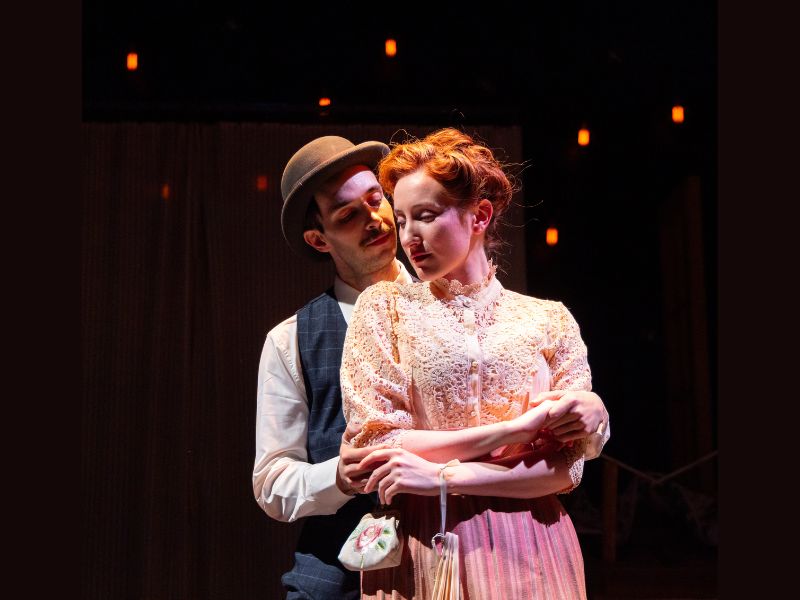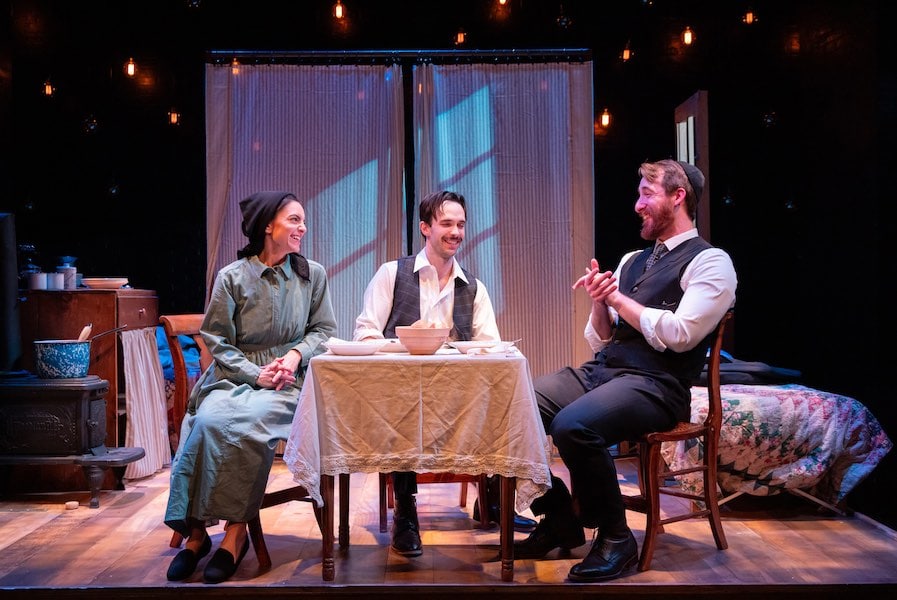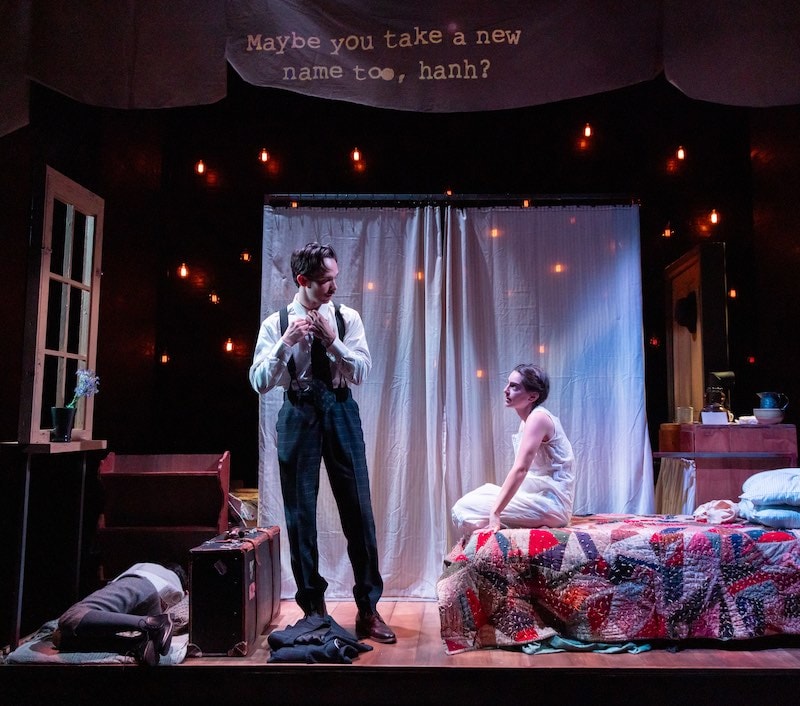Over 300,000 Eastern European Jews immigrated to America in the 1890s, many crowding into New York City’s teeming tenements. Some clung tenaciously to age-old traditions. Others craved a brand-new start, unencumbered by fealty to the past.
In 1973, filmmaker Joan Micklin Silver held a microscope on the push and pull of assimilation in the “melting pot” of New York City. Her endearing, low-budget Hester Street, based on a Yiddish story by Abraham Cahan, became a beloved classic of Lower East Side lore.

Now Hester Street has been re-imagined as a stage play by Sharyn Rothstein, directed by Oliver Butler and featuring original music and songs by Joel Waggoner. Its world premiere at Theater J is the largest production in that theater’s history.
Jake (Jake Horowitz), fueled by ambition and anger at a father who “never had the nerve” to venture beyond his own shtetl, arrived in America hellbent on becoming a Yankee. He saved for his family’s passage but when his wife Gitl (Sara Kapner) finally disembarked in New York with their young son Joey (Katie Angell), Jake is shocked and repulsed by her old-world appearance and manners.
Jake’s head has been turned by the sensual and resourceful Mamie (Eden Epstein), an immigrant who shares his desire to assimilate and prosper. Jake’s landlady, the formidable and funny Mrs. Kavarsky (Dani Stoller), dispenses practical advice while mitigating the increasing tension between Jake and Gitl. Mr. Bernstein (Michael Perrie Jr.), a pious Jew who fell short of becoming a rabbi, boards in Jake’s front room and works with him in a sweatshop. Less nakedly ambitious than Jake, Bernstein is nevertheless much wiser to the ways of America than his hot-headed friend. When Jake brags that his foreign-born son will someday become President, Bernstein pops his balloon. When the fragile Gitl, surrounded only by Jews in her new neighborhood, asks where they keep all the Gentiles, Bernstein tells her that the tenements are where the Gentiles keep the Jews.
The drama plays out on a remarkable squared-off rolling set by Wilson Chin that the actors turn by hand. On one side is the tiny bedroom shared by Jake, Gitl, and their son. The other side serves as an adjacent living room, kitchen, and a narrow space for Bernstein and his prayer books. Life and love, mischief and malfeasance play out in these diminutive spaces — heart-rending facsimiles for the cramped and dingy tenements that dotted New York City at the turn of the century. Only occasionally do the actors step outside the set as they explore their immediate surroundings — a dance hall, crowded city streets, a park, and finally a rabbi’s study.

Frank Labovitz’s terrific costuming highlights the profound differences between “greenhorns” and assimilated Jews. While Gitl clings to her shapeless brown and green dresses and refuses to give up her sheitel (a wig worn by observant, married Jewish women), the vain Mamie parades effortlessly in a breathtaking lavender ensemble. Jake dandifies his look with crisply tailored suits, thinking that he will no longer be identified as a Jew. Mrs. Kavarsky finally prevails over Gitl’s hesitations, binding her up in a gut-pinching corset, a dress, and a hat.
Waggonner’s klezmer and jazz-infused original music plays multiple roles in this production, bridging scenes and standing in for the cacophony of the Lower East Side dance halls and street markets. A talented and versatile trio of performers (Morgan Morse, Jason Cohen, and Lauren Jeanne Thomas) triple as musicians, actors, and singers. A few untitled songs comment on immigrant life, including one that asks “How long have we got?” Don’t count on America in the long term. Jews have eventually been bullied out of every nation in which they’ve settled, even if it takes centuries.

There’s a great deal of Yiddish spoken, adding texture and authenticity to the production. Subtitles in English are cleverly projected onto what looks like laundry hanging from the tops of tenements. Less successful is the actors’ Yiddish-accented English, which is inconsistent and subtly undermines their otherwise energetic performances.
Colorful as they are, few characters actually grow in Hester Street, making Gitl’s emergence as a woman who takes control of her life nothing short of a miracle. She stands in for every immigrant who has gone through the terrors of separation and the bruising, bumpy process of making do in a new world. Rothstein’s tale takes place over a century ago, but it reminds us that starting all over again is ongoing in our uncertain world.
Running Time: Two hours and 30 minutes with a 15-minute intermission.
EXTENDED: Hester Street plays through April 28, 2024, presented by Theater J at the Aaron & Cecile Goldman Theater in the Edlavitch DC Jewish Community Center, 1529 16th Street NW, Washington, DC. Purchase tickets ($50–$70, with member and military discounts available) online, by calling the ticket office at 202-777-3210, or by email ([email protected]).
The program for Hester Street is online here.
COVID Safety: Masks are required for Thursday evening and Saturday matinee performances. For more information, visit Theater J’s COVID Safety Guidelines.
Hester Street
World premiere
Written by Sharyn Rothstein
Original music and songs by Joel Waggoner
Based on the film by Joan Micklin Silver
Directed by Oliver Butler
Produced in association with Michael Rabinowitz and Ira Deutchman
CAST
Joey: Katie Angell
Rabbi and Others/Instrumentalist: Jason Cohen
Mamie: Eden Epstein
Jake: Jake Horowitz
Gitl: Sara Kapner
Joey Understudy: Alexandra Moore
Joe Peltner: Morgan Morse
Bernstein: Michael Perrie Jr.
Mrs. Kavarsky and Others: Dani Stoller
Rabbi’s Wife and Others/Instrumentalist: Lauren Jeanne Thomas
CREATIVE TEAM
Director: Oliver Butler
Associate Director & Choreographer: Nikki Mirza
Scenic Designer: Wilson Chin
Costume Designer: Frank Labovitz
Lighting Designer: Colin K. Bills
Projection Designer: Patrick W. Lord
Sound Designer: Justin Schmitz
Props Designer: Jason Dearing
Casting: Eisenberg Casting, Daryl Eisenberg, CSA
Casting Assistant: Chelsi Kern
Production Stage Manager: Anthony O. Bullock
Assistant Stage Manager: Rebecca Talisman
Assistant Stage Manager: Delaney Dunster
SEE ALSO:
Why ‘Hester Street’ matters: Sharyn Rothstein on her world premiere play with music at Theater J (interview by Ravelle Brickman, March 31, 20024)





Thank you for this evocative review, which provides wonderful snatches of dialogue and descriptions of costumes and set. I look forward to seeing it this Sunday.
However, I have one correction–the original story on which both versions are based was not a “Yiddish story” but an English novel, published at the behest of William Dean Howell, known as the “dean” of American letters. The author, Abraham Cahan, was the founder and editor of a Yiddish newspaper. And while Silver’s black-and-white film was a “classic,” the book was not. It survived mainly in the hands of English majors who discovered Cahan in courses on American Lit.